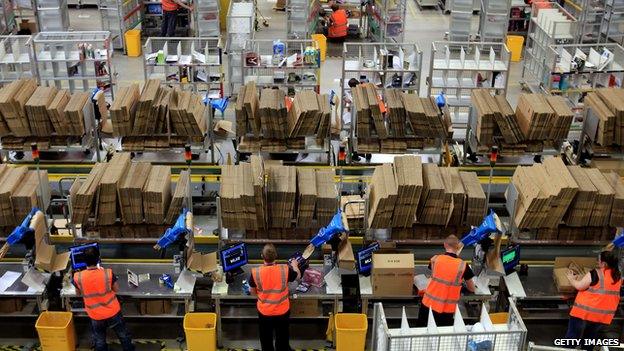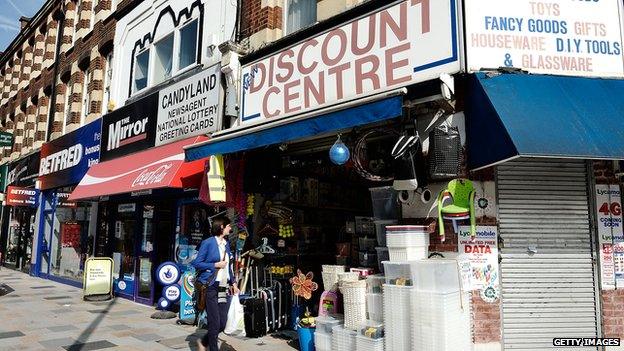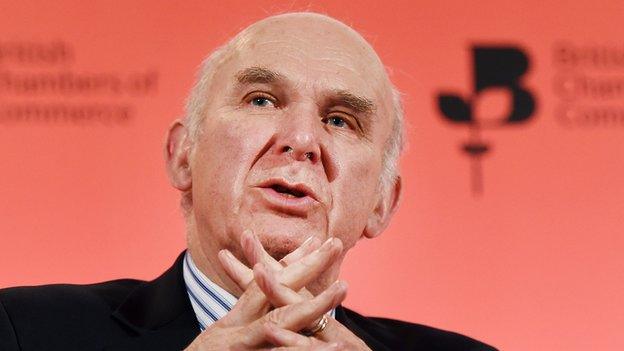Budget 2015: Business worries over cost of living wage
- Published

Businesses worry that budget benefits won't make up for the cost of a living wage
Business has voiced worries over the cost of Chancellor George Osborne's new living wage.
Wednesday's Budget outlined plans to boost the current minimum wage of £6.50 an hour to £9 by 2020.
In return, the chancellor plans benefits to business, including a reduction in corporate tax from 20% to 18% by 2020.
He also announced reductions in National Insurance and fixed annual investment allowances at £200,000.
But it was the minimum wage that worried businesses.
Katja Hall, deputy director general of the CBI business lobby group, said: "The chancellor is taking quite a gamble by introducing a living wage.
"We are going to see a living wage of £9 an hour by 2020. That means on average, it is going to be rising over 6% a year at a time when inflation is close to zero. What happens if there is an economic shock?
"I think the risk to business is, it is going to have face some tough choices around what jobs to create - possibly even job losses in some case."

The Association of Convenience Stores calls the living wage a "reckless measure"
"Reckless measure"
Many believe the retail sector will be worst hit, with small shops in particular bearing the brunt. The Association of Convenience Stores has called it a "reckless measure".
Chief executive James Lowman said: "The introduction of a compulsory living wage will have a devastating impact on thousands of convenience stores.
"This will lead to retailers having to reduce staff hours, work more hours in their business and ultimately cancel their investment plans."
But not all retailers are opposed to the idea of a living wage. The British Retail Consortium's director general, Helen Dickinson, said: "The retail industry is not a minimum wage employer.
"Median wages for hourly paid workers currently stand at £7.30 per hour - this is already above the rate of the new National Living Wage announced today.
"We continue to believe that the real key to raising more people out of low pay will rest in increasing productivity."
Unions welcomed the new living wage. TUC general secretary Frances O'Grady said: "The chancellor has finally woken up to the fact that Britain needs a pay rise.
"The TUC has long campaigned for the minimum wage to rise faster and the chancellor has listened to us at last."
Simon Walker, director general of the Institute of Directors, said: "The IoD accepts that after several years of slow wage rises, now is the time for companies to increase pay.
"Nine in 10 IoD members already pay even their most junior staff the living wage, and will accept this deal from the chancellor."
Investment allowance
Mr Walker added that the annual investment allowance, which allows businesses to offset investment in plant and machinery against tax, had been fixed at too low a rate of £200,000.
It is currently set at £500,000, but was due to fall back to just £25,000 in the autumn.
He said: "This will not help as many small and medium-sized businesses to invest for the future."
John Allan, national chairman of the Federation of Small Businesses, said: "The introduction of a new national living wage for over-25-year-olds, set at £7.20 an hour from next April, will pose significant challenges for many small firms, particularly those in the hospitality, retail and social care sectors.
"We have been supportive of gradual increases in the National Minimum Wage in recent years, to reflect the improvement in the economy.
However, we believe annual increases should be set according to the recommendations of the independent Low Pay Commission (LPC). "
- Published17 March 2015

- Published23 February 2015
